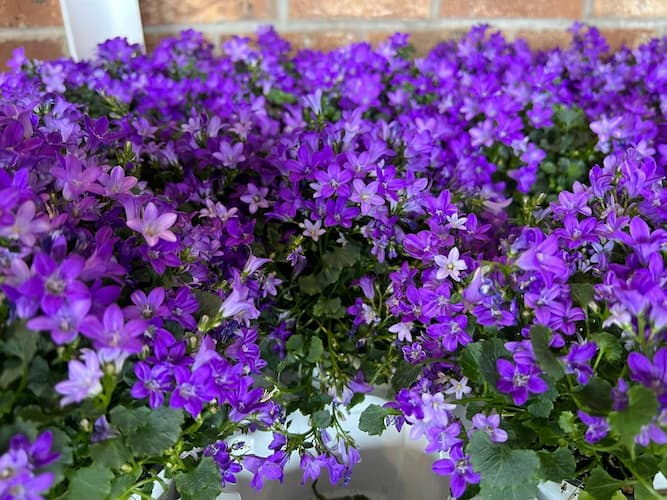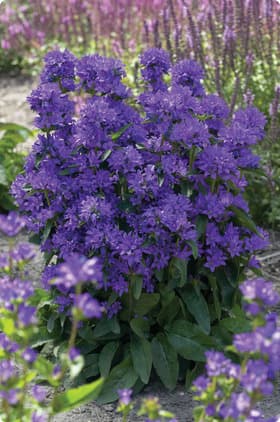How to Grow Bellflowers (Campanula)

Growing Bellflower Perennial Plants Your Home Flower Garden
Perennial Bellflower plants are a member of the Campanula flower family. Bellflowers have beautiful bell-shaped blooms with flaring petals. The blooms are very showy. The plants prefer full sun but tolerate partial shade. Try growing bellflowers to light up a partly shaded garden. Blooms usually begin in July and last through to the first frost.
As its name suggests, Bellflowers have bell-shaped blooms. The colors come in shades of blue, purple, and purple-pink. The flowers last several days.
Bellflowers look good in the flower garden, and in containers on your patio or deck. They make good cut arrangements for vases and indoor displays.
Bellflower Plant Specifications
Flower Colors: Shades of blue, purple, and purple-pink.
Flowers Bloom: Early Summer through Fall.
Plant Height: Up to 3 feet, depending upon variety.
Light Requirements: Full sun to partial sun.
Ideal Soil pH: 6.0 – 8.0.
Hardiness Zone: 3 – 10. This versatile plant grows well in most hardiness zones.
Toxicity: The leaves and flowers of some Bellflowers are edible
Native To: Northern Hemisphere.
Plant Type: Perennial
Botanical Name: Campanula
Are Bellflower Plants Edible
Yes for some varieties. No, for others.
Because only some varieties are edible, we recommend you do not eat this plant unless you are absolutely certain the variety you have is safe to consume.
Bellflower Plant Medicinal Uses
The flowers and leaves of this family of flowers has a variety of medicinal applications. Different varieties may have varying medicinal uses.
Some of the benefits are:
- Anti-microbial salves and ointments.
- Cancer fighting properties.
- Anti-inflammatory applications.
- Relieves diarrhea.
- relieve respiratory problems.
- Treats rheumatism.
Bellflower Plant Propagation
The plants are grown from seed. Bellflower seeds are tiny. They can be directly seeded into your flower garden or started indoors for transplanting later. If planting outdoors, sow Bellflowers seeds after the soil has begun to warm in the spring. For indoor starts, start them 3-4 weeks before the last frost in your area.
Sow seeds early in the season and cover lightly with 1/8″ soil. Space seeds or seedlings 12-18″ apart.

How to Grow Perennial Bellflower Plants
Bellflower plants are very easy to grow.
They prefer full sun but also do well in a light, partial shade.
Bellflower plants grow best in average, well-drained soil.
They tolerate dry soil conditions. Water plants during dry periods, once or twice per week. Keep the soil, moist, not wet.
Add a general-purpose fertilizer once or twice a season.
In rich soil, Bellflower will grow 24-36 inches tall. They fit well in the middle of your garden landscape or mixed in around rock gardens.
Once your Bellflowers are established, they will grow well and bloom until frost. Being very hardy, they will likely survive the first light frosts before going dormant for the winter.
Keep young plants well-weeded until they get established. Add a thick layer of mulch to keep weeds down, and to help retain soil moisture.
They do not require mulching or protection in the winter.
Insects and Plant Disease
Bellflower plants are resistant to insects and disease. However, on rare occasions, they can be bothered by aphids, slugs, snails, spider mites, thrips, and whiteflies.
Powdery mildew can be a problem in hot and humid weather.
If insect or disease problems occur, treat early with organic or chemical insect repellents and fungicide.
Also see: Plant Problems – causes and cures.
Related Articles
People who read this article also like:
How to Grow Bellflower Plants – by Garden Hobbies
Please support our site. Shop for:
- rmmatthews100@hotmail.com
- 585-721-6528
- Rochester, NY
©1999-2024 GardenersNet.Com, All Rights Reserved

